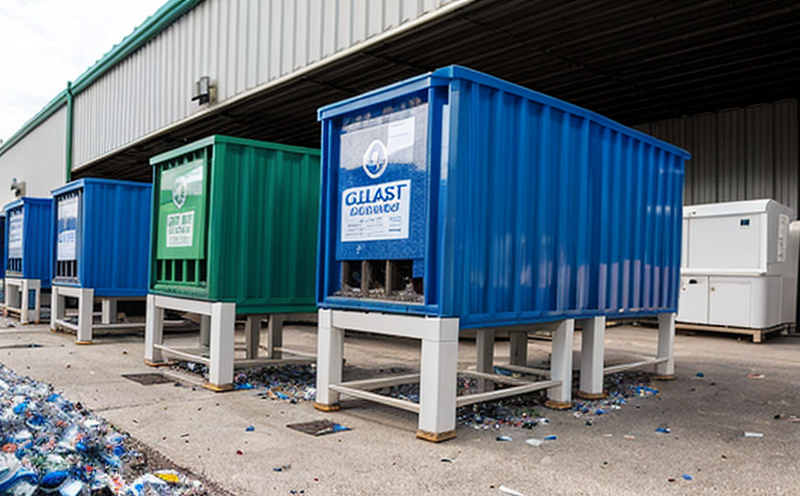ISO 12834 Total Organic Carbon in Glass Waste
The ISO 12834 standard provides a method to determine total organic carbon (TOC) in glass waste, which is crucial for ensuring the quality of recycled materials used in various sectors such as construction, manufacturing, and environmental sustainability. This test helps identify contamination levels that could affect the performance and durability of products derived from recycled glass.
The process involves several steps to ensure accurate measurement. First, sample preparation is critical; this includes drying, crushing, and sieving the glass waste to achieve a consistent particle size suitable for analysis. Once prepared, the samples are combusted in an oxygen-rich environment at high temperatures (typically around 850°C). During combustion, organic compounds decompose into carbon dioxide, which can be quantified using non-dispersive infrared detection techniques.
The significance of this test cannot be overstated. It ensures that recycled glass products meet quality standards set by international norms like ISO and ASTM. Compliance with these standards is essential for industries relying on sustainable practices to reduce their environmental footprint while maintaining product integrity.
For instance, in the construction sector, where recycled glass is often used as aggregate in concrete or asphalt, ensuring low TOC levels prevents issues such as reduced compressive strength or increased permeability. Similarly, in manufacturing applications, high organic content can lead to undesirable chemical reactions during processing or finished product performance degradation.
The test’s results also play a vital role in waste management and recycling programs by providing data that supports informed decision-making regarding the types of glass waste suitable for recycling versus those requiring alternative disposal methods. This information helps optimize resource utilization, minimize landfill contributions, and promote circular economy principles.
Moreover, adherence to ISO 12834 enhances an organization's reputation among stakeholders concerned with environmental responsibility and regulatory compliance. It demonstrates a commitment to maintaining high-quality recycled materials that contribute positively to sustainable development goals.
In summary, the ISO 12834 Total Organic Carbon in Glass Waste test is not just a technical procedure but a cornerstone of responsible waste management practices. Its implementation ensures that recycled glass products are fit for purpose, fostering trust among consumers and stakeholders alike.
Why Choose This Test
- Promotes environmental sustainability by ensuring high-quality recycled materials.
- Achieves compliance with international standards like ISO 12834 and ASTM D7659.
- Enhances product performance in critical applications such as construction and manufacturing.
- Supports informed decision-making in waste management programs.
The ISO 12834 Total Organic Carbon test is an indispensable tool for industries committed to sustainable practices. By providing precise measurements of TOC, it ensures that recycled glass meets the highest quality standards, supporting both environmental and operational goals effectively.
Quality and Reliability Assurance
The reliability of ISO 12834 Total Organic Carbon in Glass Waste testing lies in its rigorous adherence to international standards. This ensures that every test conducted adheres to best practices, yielding consistent and accurate results. Our laboratory uses state-of-the-art equipment and employs experienced technicians trained specifically for this type of analysis.
Our commitment extends beyond just performing tests; we also offer comprehensive support services including sample preparation advice, data interpretation, and assistance with regulatory compliance. By partnering with us, you gain access to expert knowledge and resources that help you make informed decisions about your waste management processes.
We understand the importance of accuracy and precision in every test conducted. Therefore, our facilities are equipped with advanced instrumentation capable of detecting even trace amounts of organic compounds. This level of sensitivity allows us to provide reliable data that can be trusted when making strategic business decisions related to recycled glass products.
In conclusion, choosing this service means entrusting your quality assurance needs to a team dedicated to excellence in analytical chemistry. With our expertise and commitment to precision, you can rest assured knowing that every aspect of the ISO 12834 Total Organic Carbon test is conducted with utmost care and professionalism.
Competitive Advantage and Market Impact
Adopting ISO 12834 Total Organic Carbon in Glass Waste testing offers significant competitive advantages. By ensuring that your products meet the highest quality standards, you position yourself ahead of competitors who may not prioritize such stringent measures.
This commitment to excellence can enhance brand reputation and customer trust, leading to increased market share. In an increasingly environmentally conscious world, consumers are more likely to choose brands that demonstrate a strong commitment to sustainability.
Moreover, achieving compliance with international standards opens up new opportunities for collaboration with other industry leaders who adhere to similar high standards. This can lead to strategic partnerships and collaborations that drive innovation and growth within your organization.
The data generated from these tests also provides valuable insights into waste streams, enabling better resource allocation strategies and more efficient recycling processes. These efficiencies translate directly into cost savings for your business while contributing positively towards reducing environmental impacts.
In summary, embracing ISO 12834 Total Organic Carbon in Glass Waste testing is not only a responsible choice but also a strategic move that enhances your competitive position and contributes to long-term success.





